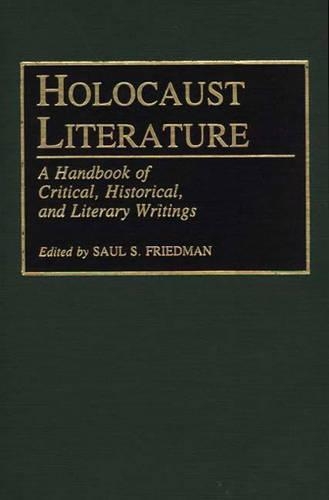
Holocaust Literature: A Handbook of Critical, Historical, and Literary Writings
(Hardback)
Publishing Details
Holocaust Literature: A Handbook of Critical, Historical, and Literary Writings
By (Author) Saul S. Friedman
Bloomsbury Publishing PLC
Greenwood Press
21st June 1993
United States
Classifications
Tertiary Education
Non Fiction
Second World War
European history
Social research and statistics
Bibliographies, catalogues
016.9405318
Physical Properties
Hardback
712
Description
Over the past forty years, the term Holocaust has come to represent the deliberate campaign of extermination of Jews by the Nazis of Germany's Third Reich preceding and during World War II. Masses of edited documents and analytical material have been generated by Holocaust scholars, and some bibliographical and encyclopedic guides to the field are available. However, a student or researcher may be confounded by the abundance of publications and may lack the necessary background and endurance to sift the wheat from the chaff. The present volume has a two-fold purpose: to offer substantial analysis in intrinsic areas of study and to assess the relevant literature in each case. Major scholars and brilliant, less established historians from Israel, Canada, and the United States have contributed more than thirty essays complete with extensive reference lists in three broad divisions. The section on conceptual approaches to the Holocaust is composed of such topics as the rise of national socialism, biographies and interpretations of Hitler, concentration camps, post-Holocaust Jewish philosophies, and the righteous gentiles. Area studies deal with aspects of the Holocaust in Poland, Hungary, Czechoslovakia, Ukraine, the Balkans, France, Holland, Italy, and Spain, and with effects and reactions in Switzerland and Britain. Arab-German collaboration and American responses are also addressed. A third section takes up Holocaust subjects in education, belles lettres, and the arts, including diaries and memoirs, fiction, poetry, books for children, art, music, and films. Although the scholars all provide evaluative surveys of their subjects and related literature, each enjoyed considerable latitude in coverage and each presents his or her own views and selections, not all of which are shared by other contributors or the volume editor. The editor also provides an introduction and a final survey of major institutions and resources for Holocaust study. A significant reference tool, this volume will be consulted by researchers at all levels in university, public, secondary, and parochial school libraries and at religious institutions.
Reviews
.,."This well-prepared volume makes a timely entrance during the fiftieth anniversary of the Second World War. ...an excellent, prescriptive guide to popular and scholarly literature and other media describing and interpreting the Holocaust. This handbook also provides the historical and social context necessary for the reader to make sense of the vast body of materials documenting this tragic period of human history. Holocaust Literature's significance lies in its role as a guide to the important works necessary for the student, scholar, and librarian to understand why and how the genocide occurred. All academic and larger public libraries need this work."-RQ Spring 1994
...This well-prepared volume makes a timely entrance during the fiftieth anniversary of the Second World War. ...an excellent, prescriptive guide to popular and scholarly literature and other media describing and interpreting the Holocaust. This handbook also provides the historical and social context necessary for the reader to make sense of the vast body of materials documenting this tragic period of human history. Holocaust Literature's significance lies in its role as a guide to the important works necessary for the student, scholar, and librarian to understand why and how the genocide occurred. All academic and larger public libraries need this work.-RQ Spring 1994
Friedman has chosen contributors who are knowledgable and show enthusiasm for their subjects. Recommended for upper-division undergraduate; graduate; faculty.-Choice
This evaluative overview performs an invaluable service.-AMERICAN LIBRARIES
This massive compendium of Holocaust material encompasses three distinct categories: conceptual issues, regional studies, and the fine arts. . . the contributions of so many recongnized scholars makes this an important reference tool.-Library Journal
"Friedman has chosen contributors who are knowledgable and show enthusiasm for their subjects. Recommended for upper-division undergraduate; graduate; faculty."-Choice
"This evaluative overview performs an invaluable service."-AMERICAN LIBRARIES
"This massive compendium of Holocaust material encompasses three distinct categories: conceptual issues, regional studies, and the fine arts. . . the contributions of so many recongnized scholars makes this an important reference tool."-Library Journal
..."This well-prepared volume makes a timely entrance during the fiftieth anniversary of the Second World War. ...an excellent, prescriptive guide to popular and scholarly literature and other media describing and interpreting the Holocaust. This handbook also provides the historical and social context necessary for the reader to make sense of the vast body of materials documenting this tragic period of human history. Holocaust Literature's significance lies in its role as a guide to the important works necessary for the student, scholar, and librarian to understand why and how the genocide occurred. All academic and larger public libraries need this work."-RQ Spring 1994
Author Bio
SAUL S. FRIEDMAN is Professor of History at Youngstown State University, where he specializes in ancient and modern Middle Eastern studies, Jewish history, and the Holocaust. His books include No Haven for the Oppressed, Incident at Massena, Amcha: An Oral Testament of the Holocaust, Oberammergau Passion Play, Without Future: The Plight of Syrian Jewry (Praeger, 1989), and The Terezin Diary of Gonda Redlich (1992). He has also published numerous essays and book chapters and reviews in such journals as Midstream, Jewish Frontier, American Historical Review, National Review, Jewish Spectator, Chronicle Review, and Congress Monthly.
